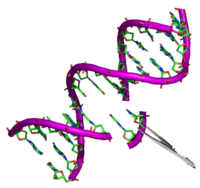
Photo from wikipedia
Purpose This research examined consumer attitudes toward genetically-modified (GM) and organic foods with a broader list of control variables that includes green attitudes, impulsive purchasing, concerns about privacy, religiosity, birth… Click to show full abstract
Purpose This research examined consumer attitudes toward genetically-modified (GM) and organic foods with a broader list of control variables that includes green attitudes, impulsive purchasing, concerns about privacy, religiosity, birth order, and political preferences. Design/methodology/approach US internet panellists were asked about their preferences for purchasing non-GM produce, non-GM cereal, and organic products even if they cost a little more. They were also asked if genetically-engineered foods are safe to consume. Responses to these four questions were dependent variables in binary logistic regressions. The sample size was 725 adults. Findings Attitudes toward non-GM produce and non-GM cereal were linked with different variables. Green attitudes were positively linked with non-GM and organic food attitudes. Impulsive purchases, a religiosity factor, and a privacy concern factor were linked with non-GM but not organic food attitudes. Social desirability bias was also significant. The geneticall...
Journal Title: British Food Journal
Year Published: 2018
Link to full text (if available)
Share on Social Media: Sign Up to like & get
recommendations!